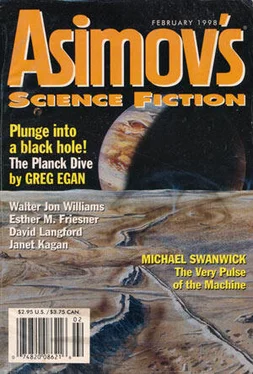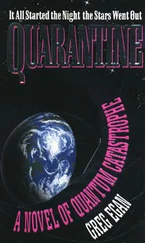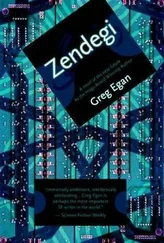Gisela eyed him balefully. “She’s here, isn’t she? Don’t try telling me that she’s bound to Athena forever, just because she was created there. Nothing’s as simple as that. Even black holes emit Hawking radiation.”
“Hawking radiation carries no information. It’s thermal noise; you can’t tunnel out with it.” Timon swept two fingers along a diagonal line, the gesture for “QED.”
Gisela said, “It’s only a metaphor, you idiot, not an isomorphism. If you can’t tell the difference, maybe you should fuck off to Athena yourself.”
Timon mimed pulling his hand back from something biting it, and vanished.
Gisela looked around the empty scape, angry with herself for losing her temper. Through the window, Chandrasekhar was calmly proceeding to crush spacetime out of existence, as it had for the past six billion years.
She said, “And you’d better not be right.”
Fifty hours before the Dive, Vikram instructed the probes in the lowest orbits to begin pouring nanomachines through the event horizon. Gisela and Cordelia joined him in the control scape, a vast hall full of maps and gadgets for manipulating the hardware scattered around Chandrasekhar. Prospero was off interrogating Timon, an ordeal Vikram had just been through himself. “Oedipal urges” and “womb/vagina symbolism” had figured prominently, though Vikram had cheerfully informed Prospero that as far as he knew, no one in Cartan had ever shown much interest in either organ. Gisela found herself wondering precisely how Cordelia had been created; slavish simulations of flesher childbirth didn’t bear thinking about.
The nanomachines comprised only a trickle of matter, a few tons per second. Deep inside the hole, though, they’d measure the curvature around them—observing both starlight and signals from the nanomachines following behind—then modify their own collective mass distribution in such a way as to steer the hole’s future geometry closer to the target. Every deviation from free-fall meant jettisoning molecular fragments and sacrificing chemical energy, but before they’d entirely ripped themselves apart they’d give birth to photonic machines tailored to do the same thing on a smaller scale.
It was impossible to know whether or not any of this was working as planned, but a map in the scape showed the desired result. Vikram sketched in two counter-rotating bundles of light rays. “We can’t avoid having space collapsing in two directions and expanding in the third—unless we poured in so much matter that it collapsed in all three, which would be even worse. But it’s possible to keep changing the direction of expansion, flipping it ninety degrees again and again, evening things out. That allows light to execute a series of complete orbits—each taking about one hundredth the time of the previous one—and it also means there are periods of contraction across the beams, which counteract the de-focusing effects of the periods of expansion.”
The two bundles of rays oscillated between circular and elliptical cross-sections as the curvature stretched and squeezed them. Cordelia created a magnifying glass and followed them “in”: forward in time, toward the singularity. She said, “If the orbital periods form a geometric series, there’s no limit to the number of orbits you could fit in before the singularity. And the wavelength is blue-shifted in proportion to the size of the orbit, so diffraction effects never take over. So what’s there to stop you doing infinite computation?”
Vikram replied cautiously, “For a start, once colliding photons start creating particle-antiparticle pairs, there’ll be a range of energies for each species of particle when it will be traveling so much slower than light-speed that the pulses will begin to smear. We think we’ve shaped and spaced the pulses in such a way that all the data will survive, but it would only take one unknown massive particle to turn the whole stream into gibberish.”
Cordelia looked up at him with a hopeful expression. “What if there are no unknown particles?”
Vikram shrugged. “In Kumar’s model, time is quantized, so the frequency of the beams can’t keep rising without limit. And most of the alternative theories also imply that the whole setup will fail eventually, for one reason or another. I only hope it fails slowly enough for us to understand why, before we’re incapable of understanding anything.” He laughed. “Don’t look so mournful! It will be like… the death of one branch of a tree. And maybe we’ll gain some knowledge for a while that we could never even glimpse, outside the hole.”
“But you won’t be able to do anything with it,” Cordelia protested. “Or tell anyone.”
“Ah, technology and fame.” Vikram blew a raspberry. “Listen, if my Dive clone dies learning nothing, he’ll still die happy, knowing that I continued outside. And if he learns everything I’m hoping he’ll learn… he’ll be too ecstatic to go on living.” Vikram composed his face into a picture of exaggerated earnestness, deflating his own hyperbole, and Cordelia actually smiled. Gisela had been beginning to wonder if morbid grief over the fate of the Divers would be enough to put her off Cartan altogether.
Cordelia said, “What would make it worthwhile, then? What’s the most you could hope for?”
Vikram sketched a Feynman diagram in the air between them. “If you take spacetime for granted, rotational symmetry plus quantum mechanics gives you a set of rules for dealing with a particle’s spin. Penrose turned this inside out, and showed that the whole concept of ‘the angle between two directions’ can be created from scratch in a network of world lines, so long as they obey those spin rules. Suppose a system of particles with a certain total spin throws an electron to another system, and in the process the first system’s spin decreases. If you knew the angle between the two spin vectors, you could calculate the probability that the second spin was increased rather than decreased… but if the concept of ‘angle’ doesn’t even exist yet, you can work backward and define it from the probability you get by looking at all the networks for which the second spin is increased.
“Kumar and others extended this idea to cover more abstract symmetries. From a list of rules about what constitutes a valid network, and how to assign a phase to each one, we can now derive all known physics. But I want to know if there’s a deeper explanation for those rules. Are spin and the other quantum numbers truly elementary, or are they the product of something more fundamental? And when networks reinforce or cancel each other according to the phase difference between them, is that something basic we just have to accept, or is there hidden machinery beneath the mathematics?”
Timon appeared in the scape, and drew Gisela aside. “I’ve committed a small infraction—and knowing you, you’ll find out anyway. So this is a confession in the hope of leniency.”
“What have you done?”
Timon regarded her nervously. “Prospero was rambling on about flesher culture as the route to all knowledge.” He moiphed into a perfect imitation, and replayed Prospero’s voice: “ ‘The key to astronomy lies in the study of the great Egyptian astrologers, and the heart of mathematics is revealed in the rituals of the Pythagorean mystics…’ ”
Gisela put her face in her hands; she would have been hard-pressed not to respond herself. “And you said—?”
“I told him that if he was ever embodied in a space suit, floating among the stars, he ought to try sneezing on the face plate to improve the view.”
Gisela cracked up laughing. Timon asked hopefully, “Does that mean I’m forgiven?”
“No. How did he take it?”
Читать дальше










